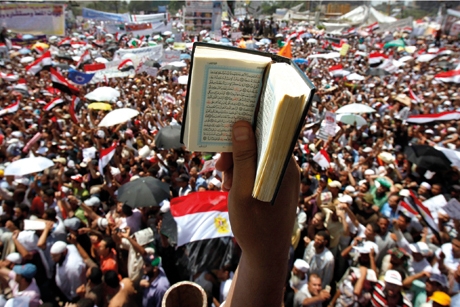Culture constitutes an essential element of human life. As people have risen up across the Middle East and North Africa, the diversity of their cultures is not only the means but also the ultimate goal of their liberation and their freedom. Though imperialism was primarily political and economic, it was also cultural; it imposed ways of life, habits, perceptions and values that rarely respected the societies under its domination, that seized control of minds — a true colonisation of human intelligence.
Globalisation extends to culture, often leading, in the societies of the Global South, to self-dispossession. Genuine liberation, the march toward dignity and democracy, requires a “cultural uprising” in all dimensions of its popular, artistic, intellectual and religious expressions. The importance of culture and the arts in undertaking the task of re-appropriation is critical: the tools of thought and tradition must be used to lend shape and substance to the sense of belonging that alone can guarantee the well-being of individuals. If there is no culture without religion, and no religion without culture and if, finally, culture is not religion, the issue must be explored; the complex questions of values, meaning, spirituality, tradition and the arts — the factors that give form to history, memory, nations and identities; that transmit well-being and freedom, or fail to — must be faced squarely.
Arab and Muslim majority societies are riven by religious and cultural tensions that have at times torn them apart. The role of the religious reference is a subject of constant discussion and heated debate over relations with tradition and with Arabic — or other national languages — have set ruling elites and intellectuals at loggerheads. Close examination and study of these experiences leads but to one sole conclusion: we are dealing with a complex, deeply rooted malaise. Its dimensions are manifold: cultural, religious, linguistic and therefore, a fortiori, strongly identity-related.
It cuts across all social sectors, all classes, and all trends of thought, from secularists to Islamists and from atheists to believers, whether observant or not. The attraction-repulsion complex vis-à-vis the West is not new; it existed even before the colonial period. It has created an ambiguous relationship in which imaginations are fascinated and attracted by the now-global Western culture, while the same force of attraction is rejected by the analytical, cultural and ethical conscience that is experienced as self-dispossession, colonisation and on occasion as the violence of cultural rape. The “Arab problem” was never simply one of the violent dictatorships that succeeded political decolonisation; it has always lain in the perpetuation of an alienating and paralysing, if not destructive, intellectual colonisation.
More than intellectual constructs
The process of reclaiming the self is one of reconciliation with meaning. Cultures, along with the religions that shape and nurture them, are value systems, sets of traditions and habits clustered around one or several languages, producing meaning: for the self, for the here and now, for the community, for life. Cultures are never merely intellectual constructs. They take form through the collective intelligence and memory, through a commonly held psychology and emotions, through spiritual and artistic communion. The Arab awakening cannot afford to overlook these, the fundamental dimensions of freedom and of the liberation of individuals and societies. The Islamic reference is of crucial importance and cries out for special attention for, like all religious references, it can have, in particular historical circumstances, a positive, liberating function — or become a reactionary, dogmatic and authoritarian instrument, an instrument of oppression. Its examination must be preceded by political and economic analysis, by systematic reference to studies in anthropology, cultures and religions.
Cultural emancipation is imperative, and will require a holistic approach. If the message of religion is to be reconciled with spirituality, cultural fulfillment can only be achieved through the celebration of and respect for the languages, memories and heritage of all, and with the positive integration of minority ethnic affiliations and dialects.
Negative effects of globalisation
Along with the West, Africa, the Islamic Orient and Asia have fallen into the trap set by the negative effects of globalisation, including but not limited to exclusivist, sectarian if not deadly claims to culture and identity. The same claims are omnipresent in the Arab world as well. Hence the importance of cultural policies, which must be developed in tandem with social policy, drawn from the common ground that determines the sense of national belongs.
Culture lends meaning to a horizon. Everything in the heritage of culture and tradition is worthy of celebration. To achieve cultural liberation means calling into question all possible forms of parallel and/or secondary alienation: economic dispossession is devastating, just as cultural imperialism can be. Spirituality, posited as a point of recall, as a quest for meaning in and through itself, individually and collectively, is an act of liberation. Yet it must be part of an open, constructive involvement that, acting from within society and in full respect of the pluralism that distinguishes those of the Middle East and North Africa, will determine the ultimate goals that body forth the cultures whose substance constitutes the narrative of each nation.
To assert culture, memory and identity is to assert that they are meaningful, to affirm that they are capable of addressing the challenges of the day. To assert one’s self is to become a subject, to take full responsibility for one’s heart, body and mind, as well as for one’s fellows, one’s society, and for nature itself. The imperative of coherence is incontrovertible; the very condition of genuine well-being and freedom. Western societies are today taking stock of the deficiencies that afflict them, that undermine the principles of democracy by maintaining a culture of fear and insecurity. Insecurity of mind is the negative image of peace of heart. Arab societies are undergoing a similar crisis, in a different way perhaps, but with equal intensity.
An awakening required
They suffer from a malaise of incoherence, and no amount of reform, or of political freedom, will resolve the feeling of unease that has sapped the foundations of East and West alike. There is no lack of obstacles to be overcome in the Middle East and North Africa. Both the political and economic difficulties are well known, as is the strength of the people’s cultural and religious references; the potential for spiritual and ethical opening is palpable. What remains is to find the means for their multiform expression. It is time to remind ourselves that in the profoundest of Islamic teachings, believers do not rise to pray during the night in order to find themselves and forget the world; they do so indeed to find themselves, the better to invest the daylight hours with meaning, and to reform the world. The Arab world and Muslim majority societies stand in need of an awakening that is responsible, free of illusions, self-critical and resolutely positive as much as they stand in need of creativity and imagination.
Reconciliation with self, liberation from intellectual and cultural colonialism, not to mention the emergence of an “Arab subject” can only take place when new life is breathed into our relationship with meaning and with ultimate goals, only when imagination, art, literature, painting and music are reclaimed. Science too, along with knowledge and the ways in which women and men express themselves and their imaginations, their hurts and desires, their grief and their hopes. The Arab world is in the throes of another crisis: the crisis of a fettered imagination from which it is struggling to escape, and that has a powerful impact on its very wellbeing. By this token, the Arab awakening must do more than overthrow dictators. It must break free of the fetters that decades of abdication have applied to the order of science, knowledge, esthetics, art and beauty in general.
Source: http://gulfnews.com/opinions/columnists/the-need-for-an-arab-cultural-revolution-1.1170789










Asalaamalaikum Professor Ramadan,
It may be true that « culture is not religion. » In theory. In practice, a constant refrain ringing forth in khutbahs from Damascus to Detroit is the proud proclamation that Islam provides « a complete way of life. » What is « culture » if not « the complete way of life » practiced by a community ?
Today, most Sunni Muslims embrace the « complete way of life » dictated by their madhab. (Only the most radical free-thinkers are bold enough to question the doctrine that one MUST belong to a madhab.) Many believe that dancing and playing musical instruments is forbidden, that angels will not enter their homes if « pictures » are hung on the walls. Unnecessary « mixing of the sexes » is prohibited. Women may not expose their awrahs by singing or dancing in public settings. A woman who wears parfum in public is « a kind of an adulteress. » Beyond this, many Muslims follow the rulings of their madhab in excruciating detail, submitting to the opinions of a tiny handful of scholars on matters such as these: Is the use of vanilla extract containing alcohol is permitted? May wudu be conducted while standing in a shower? Can women wear nail polish? To what length must pubic hair be trimmed?
Although culture is not identical to religion, some religions seem to dictate culture more than others. The very word « islam » means « submission. » In principle, that should mean submission to God. In practice, it appears to mean submitting to the dictates of an elite, hereditary power structure. To what extent this power structure will permit the flowering of significantly different regional cultures is an open question. As long as the oppressive Saudi regime continues to control Mecca, I shall remain uncautiously pessimistic.
In essay after essay, you sling around loaded phrases like « cultural imperialism » and « intellectual colonization, » without giving any concrete examples beyond the occasional hackneyed reference to Coca-cola or Hollywood. Since you seem to be intent upon blaming the cultural malaise of Muslim majority nations on The Evil West, would you please be so kind as to provide clear, concrete examples of what you are complaining about and what you hope to achieve?
Finally, I disagree most vehemently with your contention that « Everything in the heritage of culture and tradition is worthy of celebration. » Many cultural traditions are heinous and worthy only of abolition. Female genital mutilation is among the cultural traditions inherited by many Muslim majority regions. The fact that this practice has been condoned, and even encouraged, by Muslim clergy for more than 1500 years, is worthy of remembrance and critical study. The fact that many Muslims still « celebrate » this tradition should make all of us wary of what future Arab cultural revolutions might spawn.
Wa salaam,
Deborah
I for one agree with Deborah. Muslims do not need to wait for an Arab cultural revolution, but rid themselves of Arab cultural practices in order to embrace ISLAM. As long as Arabs abuse and reinterpret islam to push forward their own goals, western and other muslims don’t have anything to gain from Saudi Arabi or Egypt (the two rivaling entities) and have to start thinking for themselves.
At least Saudi’s don’t try to make something as awefull as female circumcision as part of islam. Egypt’s dirty little secret is out in the open and before anybody will take Egyptians serious they have to find a solution this problem and for their clerics endorsing this practice as part of islam, like al Qaradawi does here on onislam, which is considered to be « moderate » and universal, but openly endorses egyptian culture:
Sheikh Yusuf Al-Qaradawi, states:
Actually, this is a controversial issue among jurists and even among doctors. It has sparked off fierce debate in Egypt whereby scholars and doctors are split into proponents and opponents.
However, the most moderate opinion and the most likely one to be correct is in favor of practicing circumcision in the moderate Islamic way indicated in some of the Prophet’s hadiths – even though such hadiths are not confirmed to be authentic. It is reported that the Prophet (peace and blessings be upon him) said to a midwife: « Reduce the size of the clitoris but do not exceed the limit, for that is better for her health and is preferred by husbands ». The hadith indicates that circumcision is better for a woman’s health and it enhances her conjugal relation with her husband. It’s noteworthy that the Prophet’s saying « do not exceed the limit » means do not totally remove the clitoris.
Actually, Muslim countries differ over the issue of female circumcision; some countries sanction it whereas others do not. Anyhow, it is not obligatory, whoever finds it serving the interest of his daughters should do it, and I personally support this under the current circumstances in the modern world. But whoever chooses not to do it is not considered to have committed a sin for it is mainly meant to dignify women as held by scholars.
Allah Almighty knows best.
Why didn’t he just say it is part of Egypt’s culture and has nothing do do with islam????
Not a single word about the amazigh renaissance, also known as tafsut n imazighen??!
http://www.youtube.com/watch?v=n0vkMbKeLQ4